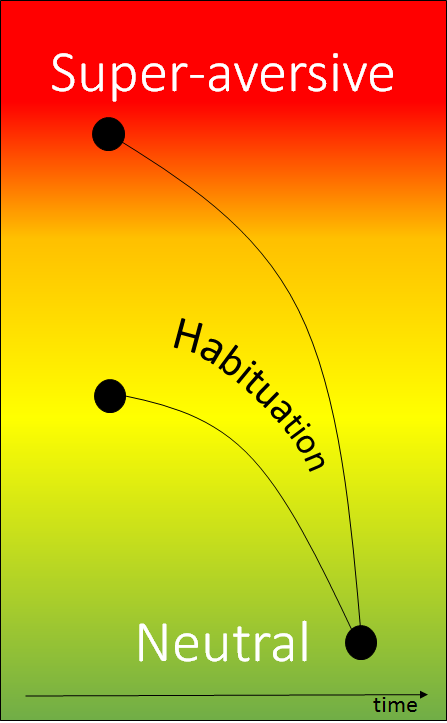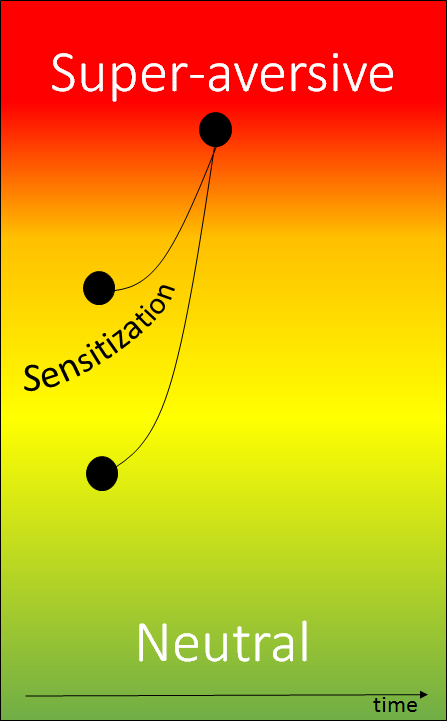Habituation to aversive stimuli
Home » » Habituation to aversive stimuliYour Habituation to aversive stimuli images are ready in this website. Habituation to aversive stimuli are a topic that is being searched for and liked by netizens now. You can Download the Habituation to aversive stimuli files here. Find and Download all royalty-free images.
If you’re searching for habituation to aversive stimuli pictures information related to the habituation to aversive stimuli interest, you have come to the ideal blog. Our website frequently provides you with suggestions for refferencing the highest quality video and image content, please kindly search and locate more informative video articles and graphics that fit your interests.
Habituation To Aversive Stimuli. Catharine Rankin at the University of British Columbia used a microscopic roundworm C. These results indicate that hyperarousal symptoms in combat-related PTSD are associated with decreased neural habituation to aversive stimuli. Habituation is a way to eliminate unconditioned responses. Reduced habituation to aversive stimuli has been observed during adolescence and may reflect an underlying mechanism of vulnerability for anxiety disorders.

The laboratory of Dr. Reduced habituation to aversive stimuli has been observed during adolescence and may reflect an underlying mechanism of vulnerability for anxiety disorders. Owing to the reflex nature of the response the authors felt that habituation to such stimuli is not likely. This study examined the startle reflex during a fear-learning task in 54 8-14-year-old girls. This study examined the startle reflex during a fearlearning task in 54 814yearold girls. Habituation of the neural response to repeated stimuli has been well demonstrated for subcortical limbic regions responding to emotionally salient stimuli.
In habituation stimuli go from aversive to neutral over time.
This study examined the startle reflex during a fearlearning task in 54 814yearold girls. Wedefine habituation as a decrease in respon siveness to a stimuluswhen that stimulus is presentedre peatedly or for a prolonged time see eg Groves Thompson 1970. Reduced habituation to aversive stimuli has been observed during adolescence and may reflect an underlying mechanism of vulnerability for anxiety disorders. Found throughout the animal kingdom some plants have also been shown to habituate Jensen Dill Cahill 2011. Respondent Aggression elicited by the presentation of an aversive event. Habituation is simply exposing the animal to some stimulus until they stop responding.
 Source: illis.se
Source: illis.se
These impairments are partially mitigated in the presence of re-experiencing symptoms such that during exposure to negative stimuli re-experiencing symptoms are positively associated with amygdalar connectivity to prefrontal regions. The behavioral inhibition system BIS regulates aversive motives in which the goal is to move away from unpleasant stimuli. Reduced habituation to aversive stimuli has been observed during adolescence and may reflect an underlying mechanism of vulnerability for anxiety disorders. Reduced habituation to aversive stimuli has been observed during adolescence and may reflect an underlying mechanism of vulnerability for anxiety disorders. An increase in negative self description if not implemented properly.

The study examined the startle reflex in fifty-four 8-10 year old girls to determine if reduced habituation to aversive stimuli during adolescence reflects underlying vulnerability to anxiety disorders. This study examined the startle reflex during a fear-learning task in 54 8-14-year-old girls. Habituation of the neural response to repeated stimuli has been well demonstrated for subcortical limbic regions responding to emotionally salient stimuli. Example sentences with habituation to stimuli translation memory. These results indicate that hyperarousal symptoms in combat-related PTSD are associated with decreased neural habituation to aversive stimuli.
 Source: researchgate.net
Source: researchgate.net
Conceptualized in our valence continuum habituation brings stimuli to neutral over time or with repeated exposure simply by exposure. Found throughout the animal kingdom some plants have also been shown to habituate Jensen Dill Cahill 2011. Reduced habituation to aversive stimuli has been observed during adolescence and may reflect an underlying mechanism of vulnerability for anxiety disorders. However habituation may also have consequences. This study examined the startle reflex during a fear-learning task in 54 8-14-year-old girls.

Because reinforcers are stimuli ha bituationmight occur when they are repeatedly presented. The laboratory of Dr. If a subject is exposed to an aversive stimulus that it cannot escape or avoid and which nothing it does has any effect on eventually its avoidance responses will extinguish Pryor 2008. The study examined the startle reflex in fifty-four 8-10 year old girls to determine if reduced habituation to aversive stimuli during adolescence reflects underlying vulnerability to anxiety disorders. Because reinforcers are stimuli ha bituationmight occur when they are repeatedly presented.
 Source: researchgate.net
Source: researchgate.net
However habituation may also have consequences. These results indicate that hyperarousal symptoms in combat-related PTSD are associated with decreased neural habituation to aversive stimuli. In habituation stimuli go from aversive to neutral over time. And anticipation of stimulus timing. Reduced habituation to aversive stimuli has been observed during adolescence and may reflect an underlying mechanism of vulnerability for anxiety disorders.
 Source: semanticscholar.org
Source: semanticscholar.org
Habituation to recurrent aversive stimuli may require aspects of cognitive control including increased attention and working memory load to encode the intensity duration and frequency of the stimulus. Decreased neural habituation to aversive stimuli. Corporal Punishment in childhood could lead to. Habituation is a way to eliminate unconditioned responses. Direct or indirect immediate or delay attempt to retaliate get even or prevent the punishment contigency.

Habituation is a process that leads to decreased responsiveness to a stimulus with repeated presentation and is often adaptive in that it makes it less likely that individuals will respond to harmless stimuli. Respondent Aggression elicited by the presentation of an aversive event. Habituation is simply exposing the animal to some stimulus until they stop responding. Reduced habituation to aversive stimuli has been observed during adolescence and may reflect an underlying mechanism of vulnerability for anxiety disorders. These impairments are partially mitigated in the presence of re-experiencing symptoms such that during exposure to negative stimuli re-experiencing symptoms are positively associated with amygdalar connectivity to prefrontal regions implicated in affective suppression.
 Source: onlinelibrary.wiley.com
Source: onlinelibrary.wiley.com
The study examined the startle reflex in fifty-four 8-10 year old girls to determine if reduced habituation to aversive stimuli during adolescence reflects underlying vulnerability to anxiety disorders. Habituation of the neural response to repeated stimuli has been well demonstrated for subcortical limbic regions responding to emotionally salient stimuli. Respondent Aggression elicited by the presentation of an aversive event. Habituation to Aversive Stimuli 8. Catharine Rankin at the University of British Columbia used a microscopic roundworm C.
 Source: researchgate.net
Source: researchgate.net
Decreased neural habituation to aversive stimuli. Respondent Aggression elicited by the presentation of an aversive event. Catharine Rankin at the University of British Columbia used a microscopic roundworm C. Reduced habituation to aversive stimuli has been observed during adolescence and may reflect an underlying mechanism of vulnerability for anxiety disorders. We examined the relationship between mean startle startle habituation pubertal.
 Source: semanticscholar.org
Source: semanticscholar.org
Catharine Rankin at the University of British Columbia used a microscopic roundworm C. If a subject is exposed to an aversive stimulus that it cannot escape or avoid and which nothing it does has any effect on eventually its avoidance responses will extinguish Pryor 2008. These impairments are partially mitigated in the presence of re-experiencing symptoms such that during exposure to negative stimuli re-experiencing symptoms are positively associated with amygdalar connectivity to prefrontal regions. Catharine Rankin at the University of British Columbia used a microscopic roundworm C. Corporal Punishment in childhood could lead to.
 Source: biorxiv.org
Source: biorxiv.org
Owing to the reflex nature of the response the authors felt that habituation to such stimuli is not likely. Habituation to Aversive Stimuli 8. And anticipation of stimulus timing. Direct or indirect immediate or delay attempt to retaliate get even or prevent the punishment contigency. Decreased neural habituation to aversive stimuli.
 Source: researchgate.net
Source: researchgate.net
In habituation stimuli go from aversive to neutral over time. And anticipation of stimulus timing. Habituation is simply exposing the animal to some stimulus until they stop responding. Example sentences with habituation to stimuli translation memory. Reduced habituation to aversive stimuli has been observed during adolescence and may reflect an underlying mechanism of vulnerability for anxiety disorders.
 Source: biorxiv.org
Source: biorxiv.org
Inhibitionmodulation of fear and anxiety triggered by the aversive stimulus. And anticipation of stimulus timing. We have defined satiationand habituation by an oper. Emotional responses crying anger escapeavoidance aggression modeling perpetuation of punishment continue use of an. Antisocial behavior delinquency low quality of relationships entering abusive relationships as abuser or victim.
 Source: biorxiv.org
Source: biorxiv.org
Habituation of the neural response to repeated stimuli has been well demonstrated for subcortical limbic regions responding to emotionally salient stimuli. Direct or indirect immediate or delay attempt to retaliate get even or prevent the punishment contigency. However habituation may also have consequences. Habituation of the neural response to repeated stimuli has been well demonstrated for subcortical limbic regions responding to emotionally salient stimuli. Because reinforcers are stimuli ha bituationmight occur when they are repeatedly presented.
 Source: illis.se
Source: illis.se
An increase in negative self description if not implemented properly. An increase in negative self description if not implemented properly. Inhibitionmodulation of fear and anxiety triggered by the aversive stimulus. We examined the relationship between mean startle startle habituation pubertal. However habituation may also have consequences.
 Source: researchgate.net
Source: researchgate.net
However habituation may also have consequences. In humans as well as animals habituation occurs to aversive stimuli on both behavioral and neuroendocrine levels Grissom and Bhatnagar 2009 and it has been argued that such affective habituation functions to promote behavioral flexibility by preventing maladaptive panic-like states Dijksterhuis and Smith 2002. Reduced habituation to aversive stimuli has been observed during adolescence and may reflect an underlying mechanism of vulnerability for anxiety disorders. Habituation is a process that leads to decreased responsiveness to a stimulus with repeated presentation and is often adaptive in that it makes it less likely that individuals will respond to harmless stimuli. Example sentences with habituation to stimuli translation memory.

Respondent Aggression elicited by the presentation of an aversive event. However habituation may also have consequences. Antisocial behavior delinquency low quality of relationships entering abusive relationships as abuser or victim. Reduced habituation to aversive stimuli has been observed during adolescence and may reflect an underlying mechanism of vulnerability for anxiety disorders. Wedefine habituation as a decrease in respon siveness to a stimuluswhen that stimulus is presentedre peatedly or for a prolonged time see eg Groves Thompson 1970.
 Source: researchgate.net
Source: researchgate.net
Dopamine has been known to decrease latent inhibition which causes a decrease in the ability to habituate to different stimuli. These impairments are partially mitigated in the presence of re-experiencing symptoms such that during exposure to negative stimuli re-experiencing symptoms are positively associated with amygdalar connectivity to prefrontal regions implicated in affective suppression. Wedefine habituation as a decrease in respon siveness to a stimuluswhen that stimulus is presentedre peatedly or for a prolonged time see eg Groves Thompson 1970. Elegans to investigate habituation to aversive stimuli in an attempt to understand. Habituation is simply exposing the animal to some stimulus until they stop responding.
This site is an open community for users to do sharing their favorite wallpapers on the internet, all images or pictures in this website are for personal wallpaper use only, it is stricly prohibited to use this wallpaper for commercial purposes, if you are the author and find this image is shared without your permission, please kindly raise a DMCA report to Us.
If you find this site beneficial, please support us by sharing this posts to your own social media accounts like Facebook, Instagram and so on or you can also save this blog page with the title habituation to aversive stimuli by using Ctrl + D for devices a laptop with a Windows operating system or Command + D for laptops with an Apple operating system. If you use a smartphone, you can also use the drawer menu of the browser you are using. Whether it’s a Windows, Mac, iOS or Android operating system, you will still be able to bookmark this website.